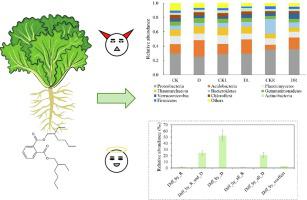Environment International ( IF 11.8 ) Pub Date : 2022-11-12 , DOI: 10.1016/j.envint.2022.107629 Longfei Jiang 1 , Xiaoping Zhu 2 , Chunling Luo 3 , Dandan Song 4 , Mengke Song 5

|
Di-(2-ethylhexyl) phthalate (DEHP) is a dominant phthalic acid ester in the environment and commonly occurs at high concentration in agricultural soils. Its influence on the soil microbial community has been widely reported, while research related to its effects on microbial structure, function, and interactions in the rhizosphere, a microbial hotspot region in the terrestrial ecosystem, is still limited. This study investigated the response of microbes in the rhizosphere to DEHP contamination. DEHP reduced microbial quantity, shifted the microbial community structure, and enriched the soil bacteria with potential DEHP degraders. Although the rhizosphere can alleviate DEHP toxicity, DEHP still played an important role in microbial community construction in the rhizosphere. Interestingly, some microbes were influenced by the synergistic toxicity effect of DEHP addition and plant growth, and there were significant differences in their relative abundance and alpha diversity in soil treated with both DEHP and planting compared to soils with just DEHP spiking or planting. The genes related to cell motility, metabolism of terpenoids and polyketides, protein families, genetic information processing, and replication and repair pathways changed only in soil treated with both DEHP and planting further proved the existence of synergistic toxicity. Anyway, the impact of DEHP on microbial function in the rhizosphere was important with 52.42‰ of the genes being changed. The change in cell motility, biofilm formation, and genes related to the quorum sensing pathway might affect the relationship between microbes, which play a crucial role in ecosystem function. This was further proven by changes in the microbial co-occurrence pattern. Our results can benefit risk evaluation of DEHP to microbial community in the rhizosphere, which is important for the effective function of terrestrial ecosystems and soil health.
中文翻译:

邻苯二甲酸二(2-乙基己基)酯与植物生长的协同毒性作用扰乱了根际土壤微生物的结构和功能
邻苯二甲酸二(2-乙基己基)酯 (DEHP) 是环境中主要的邻苯二甲酸酯,通常以高浓度存在于农业土壤中。它对土壤微生物群落的影响已被广泛报道,而关于它对根际微生物结构、功能和相互作用的影响的研究仍然有限,根际是陆地生态系统中的微生物热点区域。本研究调查了根际微生物对 DEHP 污染的反应。DEHP 减少了微生物数量,改变了微生物群落结构,并使土壤细菌中含有潜在的 DEHP 降解物。虽然根际可以减轻DEHP的毒性,但DEHP在根际微生物群落构建中仍然发挥着重要作用。有趣的是,一些微生物受到 DEHP 添加和植物生长的协同毒性效应的影响,与仅添加 DEHP 或种植的土壤相比,在同时添加 DEHP 和种植的土壤中,它们的相对丰度和 α 多样性存在显着差异。与细胞运动、萜类化合物和聚酮化合物代谢、蛋白质家族、遗传信息处理以及复制和修复途径相关的基因仅在同时用 DEHP 和种植处理的土壤中发生变化,进一步证明了协同毒性的存在。无论如何,DEHP 对根际微生物功能的影响很重要,有 52.42‰ 的基因发生了变化。细胞运动、生物膜形成和与群体感应通路相关的基因的变化可能影响微生物之间的关系,对生态系统功能起着至关重要的作用。微生物共生模式的变化进一步证明了这一点。我们的研究结果有助于评估 DEHP 对根际微生物群落的风险,这对于陆地生态系统的有效功能和土壤健康具有重要意义。



























 京公网安备 11010802027423号
京公网安备 11010802027423号